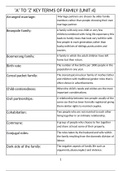Other
(Cambridge IGCSE Sociology) unit 4 :family key words
- Course
- Institution
- Book
Unit 4: Family This unit offers candidates the opportunity to explore the sociology of the family, including definitions,structure, variations and alternatives, and changing roles and relationships within the family. This document contains definitions of the key terms for the unit 4 that are requir...
[Show more]



